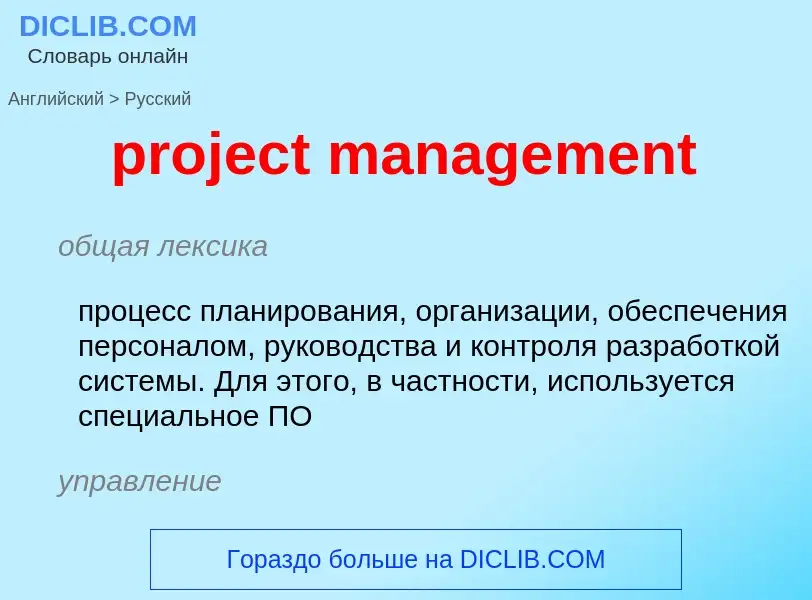Μετάφραση και ανάλυση λέξεων από την τεχνητή νοημοσύνη ChatGPT
Σε αυτήν τη σελίδα μπορείτε να λάβετε μια λεπτομερή ανάλυση μιας λέξης ή μιας φράσης, η οποία δημιουργήθηκε χρησιμοποιώντας το ChatGPT, την καλύτερη τεχνολογία τεχνητής νοημοσύνης μέχρι σήμερα:
- πώς χρησιμοποιείται η λέξη
- συχνότητα χρήσης
- χρησιμοποιείται πιο συχνά στον προφορικό ή γραπτό λόγο
- επιλογές μετάφρασης λέξεων
- παραδείγματα χρήσης (πολλές φράσεις με μετάφραση)
- ετυμολογία
project management - translation to Αγγλικά
общая лексика
процесс планирования, организации, обеспечения персоналом, руководства и контроля разработкой системы. Для этого, в частности, используется специальное ПО
управление
проектный менеджмент
управление проектом (система методов управления, разработанная для осуществления конкретных задач группой сотрудников в конкретные сроки в уже существующей структуре организации)
строительное дело
управление строительством (обычно с привлечением генподрядчика)
Смотрите также
Ορισμός
Βικιπαίδεια
Project management is the process of leading the work of a team to achieve all project goals within the given constraints. This information is usually described in project documentation, created at the beginning of the development process. The primary constraints are scope, time, and budget. The secondary challenge is to optimize the allocation of necessary inputs and apply them to meet pre-defined objectives.
The objective of project management is to produce a complete project which complies with the client's objectives. In many cases, the objective of project management is also to shape or reform the client's brief to feasibly address the client's objectives. Once the client's objectives are clearly established, they should influence all decisions made by other people involved in the project – for example, project managers, designers, contractors, and subcontractors. Ill-defined or too tightly prescribed project management objectives are detrimental to decision-making.
A project is a temporary and unique endeavor designed to produce a product, service, or result with a defined beginning and end (usually time-constrained, and often constrained by funding or staffing) undertaken to meet unique goals and objectives, typically to bring about beneficial change or added value. The temporary nature of projects stands in contrast with business as usual (or operations), which are repetitive, permanent, or semi-permanent functional activities to produce products or services. In practice, the management of such distinct production approaches requires the development of distinct technical skills and management strategies.



![[[Henry Gantt]] (1861–1919), the father of planning and control techniques [[Henry Gantt]] (1861–1919), the father of planning and control techniques](https://commons.wikimedia.org/wiki/Special:FilePath/Henry Gantt.jpg?width=200)



.png?width=200)
.png?width=200)


